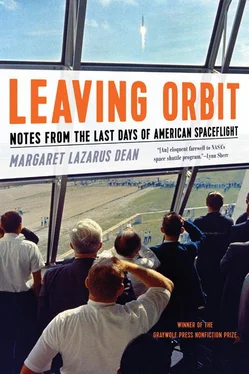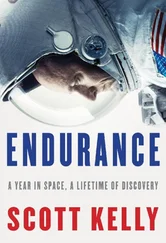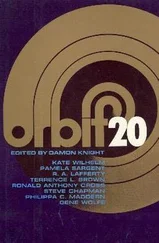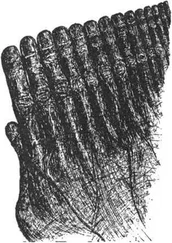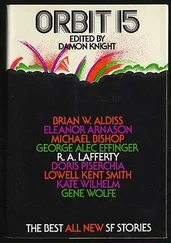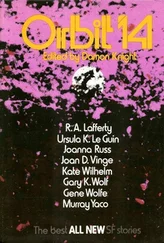I fell in love. My father, brother, and I came back to see this film over and over, and I practically memorized it frame for frame: the launch scenes, landing scenes, footage of Earth turning outside the windows of the space shuttle. Scenes of mundane domestic life lived inside the spaceship, smiling astronauts in shorts and sock feet. They work, eat, chat in their headsets with Houston, float companionably together. Judith Resnik sleeps in space.
Six months later, in January 1986, Challenger would explode in the sky with Judith Resnik on board. The metal machines were no longer invincible, it turned out; the adults were not actually in control of them or of anything else. The space shuttle program would never recover from Challenger , its goals scaled back and its future curtailed. Seventeen years later, as I was writing my first novel, about children whose lives were changed by Challenger , space shuttle Columbia was destroyed during reentry, killing all seven astronauts and leaving debris across three states. The end of the program was written in its disasters: an accident board investigating the 2003 Columbia disaster recommended retiring the shuttle in 2010, a recommendation the government has adopted.
Together the five orbiters Columbia, Challenger, Discovery, Atlantis , and Endeavour have flown a total of 133 successful missions, an unequaled accomplishment of engineering, management, and political savvy. But it’s the two disasters that people remember, that most shape the shuttle’s story. The lovely dream of spaceflight I grew up with is marred by the images of Challenger and Columbia breaking apart in the sky, the lost astronauts smiling on hopefully in their portraits, oblivious. Some people took the disasters to mean the entire space program had been a lie, that the dream itself was tainted with our fallibility. But even as a child, I knew it was more complex than that. If we want to see people take risks, we have to be prepared to sometimes see them fail. The story of American spaceflight is a story with many endings, a story of how we have weighed our achievements against our failures. It may also be a story with many futures—new spacecraft will leave Earth one day, whether they belong to NASA or not, and some of the spacefarers traveling on those new spacecraft will be killed. We are at a moment of reconsidering what this means.
* * *
I kept going to Air and Space until, at thirteen, I would move away from Washington. But I would remember what I saw there, remember which artifacts were in which room, the way we remember our childhood homes. While I was doing research for my first novel, I would read that Gemini astronauts coming back into the airlock after the first space walks noticed a distinct smell coming in with them on their space suits, a smell of something cooked or burned, a smell both barren and homey. It was the smell of outer space itself. The astronauts found this smell hard to describe, but I could imagine it exactly: it smells like walking into the atrium of the Air and Space Museum with my father and my brother on a hot Saturday morning in the early 1980s. People often ask me how I became interested in space, and I usually share a more logical beginning—I tell about taking astronomy my first year in college, or about seeing Challenger explode on TV as an eighth-grader, or about witnessing my first shuttle launch in 2001. All these things are true, but the real truth is a little more confused and intimate, as it always is. The truth is the air-conditioned, musty smell of Air and Space, the crisp homey smell of the cosmos, a space-scarred Apollo capsule, the floating black curls of Judith Resnik, and my father’s calm voice.
For Americans of my parents’ generation, it takes no mental effort to conjure the feelings that came along with the heroic era of spaceflight from 1961 to 1972: the wonder and the awe, the risk and the ambiguity. But for those under forty-five or so, who are now in the majority, those feelings about spaceflight are clichés, the stories of our elders and the sound tracks of the movies, the lone trumpet signifying the daring and the grace.
Though I’m under forty-five, too young to have seen Neil and Buzz climb out of their lunar module, too young to have witnessed the prime of NASA, I love the idea of spaceflight. I love the audacity of the handsome young president challenging us to go to the moon not because it is easy but because it is hard; I love the young scientists and engineers who took his charge as their personal religion and made inestimable sacrifices to meet John Kennedy’s challenge after his death. I love the fire and the rockets, the thundering wonder of building-sized objects hauling themselves off the launchpads and past the grip of gravity. The badass steeliness and crew cuts of the test-pilot sixties astronauts, the engineers in their short-sleeved dress shirts and dark ties, the technicians in their greasy uniforms. I love the old ladies wearing cat’s-eye glasses and drinking tea while they stitch together the seams of the space suits that will be the only barrier between moonwalkers and the sucking black vacuum of space. Above my desk is a photograph of the stainless steel plaque that rests on the Sea of Tranquility on the surface of the moon. Printed on it are these words:
HERE MEN FROM THE PLANET EARTH
FIRST SET FOOT UPON THE MOON
JULY 1969, A. D.
WE CAME IN PEACE FOR ALL MANKIND
Is this not stirring? Rarely is such grandiose language earned by such specific and deliberate action, and this action is the counterbalance to the legacy of the failures. Few Americans were aware of it at the time, but looking back we can see that the beginnings of the end of spaceflight were already present at the triumphant moment of Apollo 11—the funding already reduced, the goals already compromised, three dead astronauts already martyred to the cause. In the future, fourteen more will die, and the shuttle project will never entirely recover from their deaths. But the plaque knows nothing of all that, and I love it for that reason, for the vigorous simplicity of its language. I love the language of spaceflight: the go and the no-go, the translunar injection burn, the nod and the twang. The names Neil Armstrong and Buzz Aldrin. The sonorousness of the very acronym NASA. These are the sounds of dreams. Can we who were not there be blamed for wondering whether it was all a dream?
CHAPTER 1. The Beginnings of the Future: This Is Cape Canaveral
The trees rose solid as a rampart, the last boundary of the Earth, and beyond stretched the spaceport for the space flight to the Moon: a silence of sand and water, a handful of islands thrown down by God on the seventh day when He couldn’t think what else to do with them…. The tallest and biggest building seemed to touch the clouds.
—Oriana Fallaci,
If the Sun Dies
The most important events in America seemed to take place in all the lonely spaces.
—Norman Mailer,
Of a Fire on the Moon
Cape Canaveral was in Florida, but not any part of Florida you would write home about.
—Tom Wolfe,
The Right Stuff
Family Day: September 25, 2010
Say the words out loud: Cape Canaveral. Say them in JFK’s voice, in John Glenn’s voice, in Walter Cronkite’s voice. The very syllables connote rockets and bravery, the countdown to zero, heroes in helmets, banks of inscrutable computers. So it’s strange that when you visit the Kennedy Space Center in Florida, when you make the drive from Orlando or from the beach towns south or north, you must first drive through miles of green flats, the low pulsing of insects all around you, alligators lurking in ditches, before you finally encounter the structures built by NASA in the sixties.
Читать дальше
